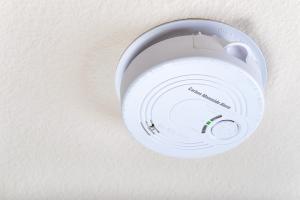Think about fitting a carbon monoxide alarm
Date published:

Instant warning
You can be particularly at risk from carbon monoxide poisoning when asleep, because you may not be aware of the symptoms until it's too late.
Always make sure your fuel-burning appliances are properly installed, used and maintained.
All new homes in Northern Ireland must have a carbon monoxide alarm installed.
Audible alarms give an instant warning of dangerous carbon monoxide levels. The use of ‘black spot labels/ cards’ is not recommended.
You can find out more about the symptoms of carbon monoxide poisoning on the following pages:
Audible alarms
Audible carbon monoxide alarms come in many varieties and are manufactured by a wide range of companies.
They are sold online and in many shops, including DIY/ hardware stores, supermarkets and trade retail stores.
What to look for when buying an alarm
Before buying a carbon monoxide alarm, always make sure it:
- complies with British Standard EN 50291
- carries a British or European approval mark, such as a CE or Kitemark
Follow the manufacturer's instructions on how a carbon monoxide alarm should be installed, checked and serviced.
Check the lifespan of the alarm. Some have replaceable/ removable units, while others are sealed in for the life of the unit.
Where to fit an alarm
Always read the manufacturers instructions for the correct and safe location for the alarm.
Carbon monoxide is slightly lighter than air, therefore fitting carbon monoxide detectors at a low level is not recommended.
It's not possible to give specific guidance on the exact location of a detector(s) which suits all types of premises and their usage.
Once the alarm is fitted
Always test your carbon monoxide alarm to the manufacturer’s instructions.
Any alarms failing a routine test should be returned to the installer or supplier, or be replaced.
Never cover or paint over alarms once installed.